L8: Game Theory 1
1/37
There's no tags or description
Looks like no tags are added yet.
Name | Mastery | Learn | Test | Matching | Spaced |
|---|
No study sessions yet.
38 Terms
Game Theory in real life
Game theoretical computer models have helped to predict:
The successors of dictators
Where we could find Osama Bin Laden
Which leaders would fall from power
Have brought insides when it comes to negotiations within the EU
Have led to knowledge about vote trading in EU institutions
Are used in auctions
Have helped to decide when to set up a company (and where) and gives insights in the current market
Game
"A competitive activity... in which players contend with each other according to a set of rules"
Game theory
“A formal representation of a situation in which a number of individuals interact in a setting of strategic interdependence"
What is game theory?
Formal study of strategic interactions
It is the study of how we mathematically determine the
best strategy given conditions to optimize the outcomeHow do we get the most utility?
It helps to analyze situations more rational and formulate acceptable alternatives
What are people doing and how do we react?
Everything can be considered a game (in a game theoretical sense)
At least twelve (!!) game theorists have won the Nobel prize in economics so far....
History
Game theoretical notions go back for hundreds of years
Talmud: dividing a dead man’s estate between three creditors
Robert Aumann and Micheal Maschler cracked the ‘code’
Sun Tzu’s writings: strategic warfare
Modern game theory credited to John von Neumann
John von Neumann and Oskar Morgenstern
Expected utility theory creators
John Nash generalized these results and provided the basis of the modern field of game theory
What is a game?
A set of players {A,B, C...}
A set of strategies
The payoff (i.e., what a player gets) is listed for each possible list of strategies of each player
Utility
Types of games
Simultaneous vs Sequential games
Players move at the same time or the action of one depends of another
Single play vs Iterated games
Games is played only once vs multi-stage games
Zero vs positive sum games
The same of the payoff remain constant during the game vs they change
One winner vs we can win together
Complete vs incomplete information games
Players know or do not know each others payoffs
Everything is known to every player vs not
Non-cooperative vs cooperative games
Players can or cannot form binding agreements and coalitions
Example of two player game
The players are called {A, B}
Player A has two strategies: "Up" and "Down" {U,D}
Player B has two strategies: "Left" and "Right" {L,R}
These strategies are placed in a table together with the payoffs for both players for each of the four possible strategies
Payoffs = utility
These tables are called payoff matrix (normal form games)
For now, we focus on games with complete information: every player knows the payoffs of the other
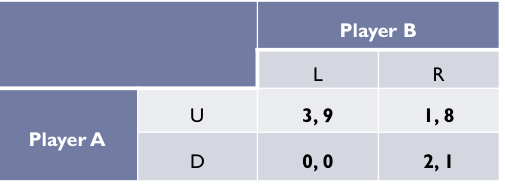
Play
is a pair, such as (U,R) where the first element is the strategy chosen by Player A and the second is the strategy chosen by Player B
A set of strategies → one for each player
Payoff matrix: which numbers should i compare?
If B plays left, the A has to decide between up and down —> choose between 3 and 0
Higher number is the one you are more likely to play
If player A always chooses up, B needs to decide between left and right —> 9 or 8
Compare the ones that have the same color
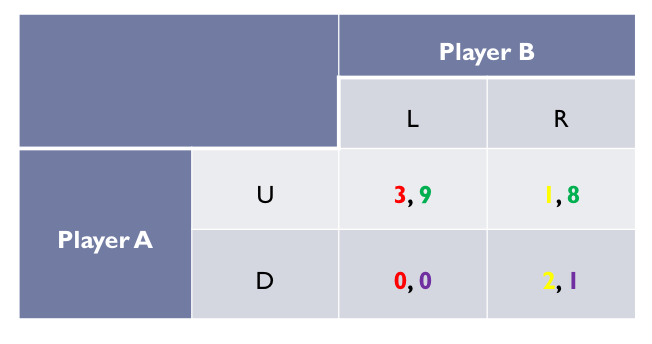

Which of the following plays are likely to occur?
U, R
D, R
D, L
U, L
U, R: no bc both players have incentive to deviate
D, R: yes bc they both gain more from staying than deviating → no incentive to change
D, L: no bc both players have incentive to deviate → more utility if change
U, L: yes bc both gain more by staying
What strategies are a Nash equilibrium?
U, L & D, R
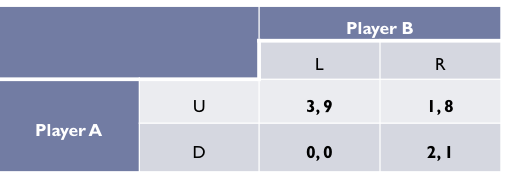
John Forbes Nash
Born in 1928 in Virginia
Engineer at heart, chemistry, but ultimately mathematics
His PhD thesis (Princeton) formulated the concept of Nash equilibrium
Now regarded as a basic building block of game theory!
After defense, he produced several papers setting out several different theories
In 1959: acute paranoid schizophrenia
Everyone accepted it → was able to work at Princeton
From 1990 onward: progressive healing
1994: Nobel Prize in Economics
200l: A beautiful mind
2015: Abel prize and died in a car crash
Nash Equilibrium
a set of strategies, one for each player, such that no player has incentives to change his or her strategy
One person deviating for a NE strategy would result in the same payout or lower payout for that person
It is the mutual best response
It is the happy place for both players
It is inherent stable!
Pure strategy Nash equilibrium PSNE
players only play a single strategy in equilibrium
100% play one strategy
U, L and D, R are an example of PSNE
Mixed strategy Nash equilibrium MSNE
players play a combination of several strategies with a fixed probability ie they randomize between strategies
Nash equilibrium: problems
A game can have several Nash equilibria ((U,L) and (D, R) in our example) — so what is the outcome then?
—> different ways to argue which NE would be the best one
There may not be a Nash equilibrium in pure strategies
Need mixed
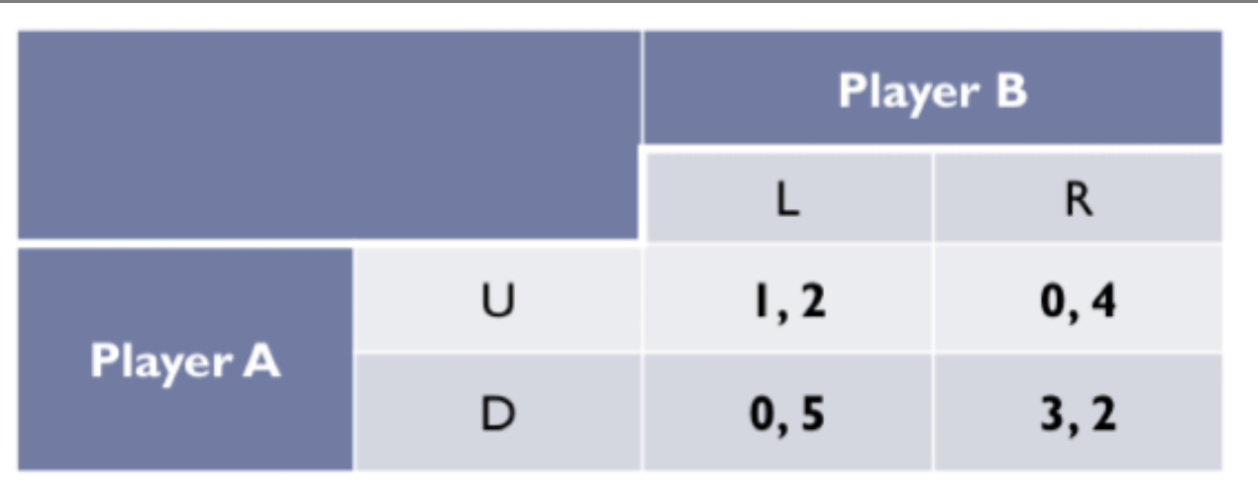
Are there any pure strategy Nash equilibrium?
No in each quarter, player A or B will want to deviate
Prisoners Dilemma
If no one confesses (Silence) for the robbery, the police can only charge the prisoners for trespassing
Punishment: I month in jail each
If one confesses (Confess) and the other does not (Silence), the police will be lenient on the rat and severely punish the quiet one:
Punishment: 12 months in jail for the quiet one, 0 months for the rat
If both confesses (Confess), the police will punish both equally
Punishment: 8 months in jail each
Payoff:
Both stay silent both have an incentive to change to confess
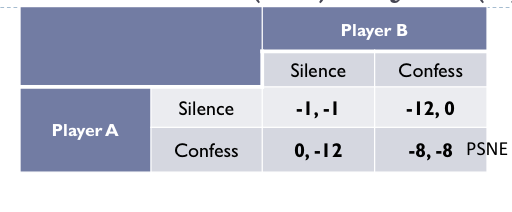
Strictly dominant strategies
strictly dominates another strategy for a play if it generate a greater payoff regardless of what other players do
Players never play strictly dominated strategies
a strictly dominant strategy is that strategy that always provides greater utility to a player, no matter what the other player's strategy is;
a weakly dominant strategy is that strategy that provides at least the same utility for all the other player's strategies, and strictly greater for some strategy
Prisoners Dilemma NE
The only Nash equilibrium (in pure strategies) for this game is (C, C), even though (S, S) gives both players better payoffs
The only Nash equilibrium is so-called Pareto inefficient
Pareto inefficient
The outcome is suboptimal for both prisoners
Would the prisoners dilemma change if they were allowed to communicate with each other?
Even if they make a deal before they go to the interrogation room; this deal will not uphold because they have individual incentives to deviate from keeping silent
PD and reality
PD games shows that even if there is a solution that makes both players better off, the rationality of players does not lead to it
Shows how difficult it is for people to cooperate
Lack of communication is not the real problem but lack of trust! Even if they communicate, can they trust each other to hold onto the agreement?
Answer: no
Does this scenario look familiar to you?
Looks like a collective action problem
This property made this game a popular structure for modeling many political, economic, sociological, biological phenomena
Examples?
Climate change policy
Arms race
Even if cooperation is best for everyone, there is always incentive to deviate
Example of prisoners dilemma
George Conway: Conservative lawyer (former republican)
Argues in a podcast called "Trump's 91 problems (& Jail is One)" that...
"This has been the prisoner's dilemma problem of the Republican party... Nobody actually wants to go out and tell the truth about this guy because they don't want to be out there standing alone."
Even though Republican senators would be better off fighting Trump's attack on democracy
They are not doing it, they are trapped
Is this really a PD game?
No be there is no incentive to switch - they are all staying silent and supporting Trump
Nash Equilibrium summary
Technically, a Nash equilibrium is a set of strategies, one for each player, such that no player has incentive to change his or her strategy given what the other players are doing
Practically speaking, a Nash equilibrium is a law that no one has incentive to break even in the absence of an effective police force. In a sense, these laws are self-enforcing
There can be multiple Nash equilibria in a game
There can also be no PSNE in a game
Stag Hunt game
a game that describes a conflict between safety and social cooperation
Also known as the "assurance game", "coordination game", and "trust dilemma"
Some say that it better represents reality in comparison to PD games
Principle: if people's actions complement each other, then getting a good outcome depends not just on what people value but on how they expect each other to behave
Stag hunt: background
A group of hunters are on the hunt for stags
If they work together, they can kill the stag, if not, the stag flee, and they will go hungry
Stag is not easily found, while waiting they see a hare
Stag hunt: the game
If a hunter leaps out and kills the hare, he will eat, but the trap laid for the stag will be wasted and the other hunters will starve
There is no certainty that the stag will arrive; the hare is present
Stag hunt: dilemma
If one hunter waits, his fellow hunter might kill the hare for himself, sacrificing everyone else
This makes the risk twofold; the risk that the stag does not appear, and the risk that another hunter takes the kill
Stag hunt payoffs
Highest pay-off (5,5) when both work together and kill the stag
If one kills the rabbit he can eat (4), but another hunter has nothing
If both work together and kill the rabbit they get (2,2)
If hunter I picks Stag, best response is to also pick Stag over Hare (5>4)
If hunter 2 picks Hare, it is more sensible to also pick Hare (2>0)
Player I strategy is completely dependent on player's 2 choice and the other way around
No strict dominant strategy
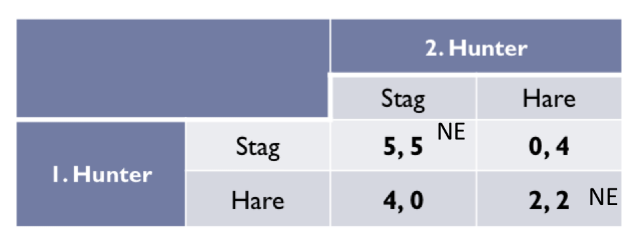
Stag hunt: focal point
Which one do you choose of the NE?
4, 4 is the better outcome as both players are happier
Thomas schilling called this superior equilibrium
Schilling argues it can be determined culturally or by communication
Stag hunt vs prisoners dilemma
PD: despite cooperation is Pareto optimal outcome, the only PSNE is to defect
SH: selfish incentives can produce social cooperation
Nash equilibriums are not always good or Pareto efficient; but they are stable!
Chicken game: principle
It is an influential model of conflict escalation
The principle of the game is that while it is preferable not to yield to the opponent, if neither player yields, this outcome is the worst possible one for both players
It is a so-called 'anti-coordination game', in which it is mutually beneficial for the players to play different strategies
Also called hawk-dove game
Chicken game: story
Two guys are at the opposite side of the road, pointing their cars to each other
Driving right at each other
Before they collide, they have to decide : risk a crash or swirl off to the side and risk reputation costs
Chicken game: payoff
If both keep going, they might crash and die - so high negative payoffs (-100)
If one keep going straight and the other swerve; the one that keeps going shows how tough, he is (positive utility: +2) and the other that he is a looser (negative payoffs: -2)
If both swerve, not much will happen
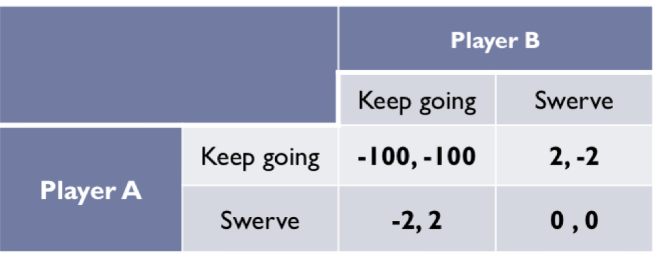
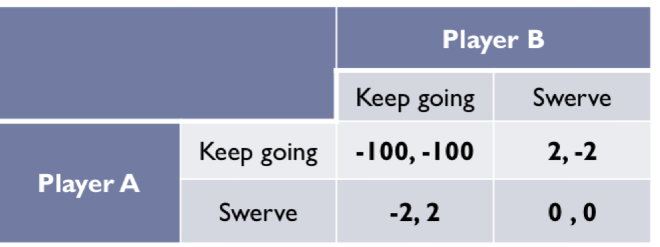
Chicken game: best response
(A: Keep Going, B: Swerve)
(A: Swerve, B: Keep Going)
Chicken game: problems
how do we decide who is the one keep going and who is the one that swerves?
Is there any intuitive idea?
We cannot enforce one of the two PSNE equilibrium
A possible solution: Mixed Strategy Nash Equilibrium